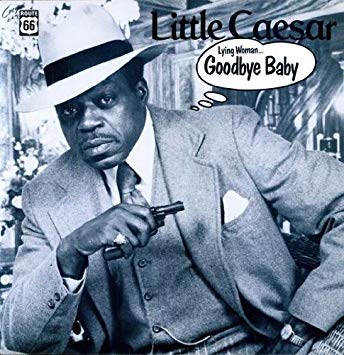Horace Caesar
b. February 28th, 1928 in Pittsburgh (Pennsylvania)
d. June 14th, 1994 in Los Angeles (California)


LYING WOMAN...GOODBYE BABY
Route 66
1953
YOUR ON THE HOUR MAN
Ace
1953 - 1960
Il eut une enfance mouvementée dans les ghettos de Youngstown (Ohio). Il partage son temps entre la boxe et le chant. Après l'armée en 1950, Little Caesar s'installe à Oakland. Il rejoint la formation de Que Martyn (alias Quedellis Martyn) dont il devient le chanteur attitré. En leader, Caesar enregistre d'abord pour Modern-RPM en 1951 puis surtout au sein du label Recorded in Hollywood de John Dolphin l'année suivante. Ses superbes "Goodbye baby" et "Lying woman" sont des titres étonnants sur des thèmes similaires. On peut également citer "Going down to the river", "Move me", "Here is a letter", "Do right blues", "Tried to reason with you". Dans ces titres, il montre ses talents de blues-shouter dans un style West Coast Blues typique. Derrière lui, il est supporté par d'excellents musiciens de studio comme Maxwell Davis, Red Callender, Chico Hamilton et "Papa" John Creach. En 1955, Little Caesar intègre The Turbans, un groupe de Doo-Wop. Dès la fin des années 50, il abandonne progressivement la musique et devient acteur. Un premier recueil de son oeuvre parait en 1983 grâce au label suédois Route 66 de Jonas Bernholm. Cette sélection se concentre sur sa meilleure période. Le CD Ace offre lui un panorama plus large de l'oeuvre de Little Caesar y compris ses titres avec les Turbans et ses morceaux plus tardifs bien éloignés de son West Coast Blues initial.
He had an eventful childhood in the ghettos of Youngstown (Ohio). He divides his time between boxing and singing. After the army in 1950, Little Caesar moved to Oakland. He joined the band of Que Martyn (alias Quedellis Martyn) of which he became the official singer. As a leader, Caesar first recorded for Modern-RPM in 1951 and then especially with John Dolphin's Recorded in Hollywood label the following year. His superb "Goodbye baby" and "Lying woman" are amazing titles on similar topic. We can also point out "Going down to the river", "Move me", "Here is a letter", "Do right blues", "Tried to reason with you". In these titles, he shows his blues-shouter skills in a typical West Coast Blues style. Behind him, he is supported by excellent studio musicians like Maxwell Davis, Red Callender, Chico Hamilton and "Papa" John Creach. In 1955, Little Caesar joined The Turbans, a Doo-Wop band. From the end of the 1950's, he gradually abandoned music and became an actor. A first collection of his work appeared in 1983 thanks to Jonas Bernholm's swedish label Route 66. This selection focuses on his best period. The Ace CD offers a broader overview of Little Caesar's work, including his titles with the Turbans and his later songs far away from his original West Coast Blues.